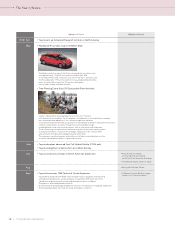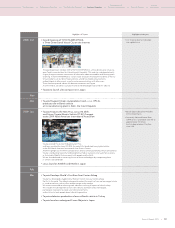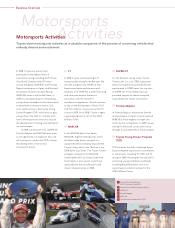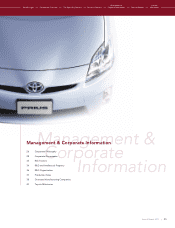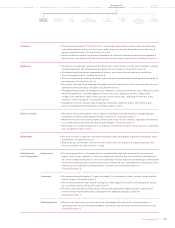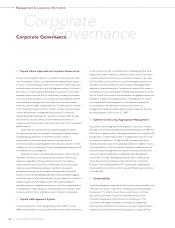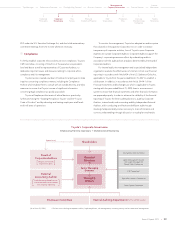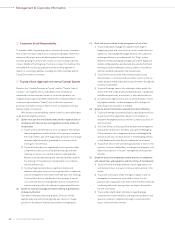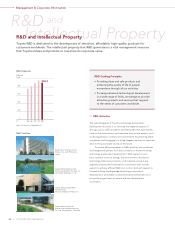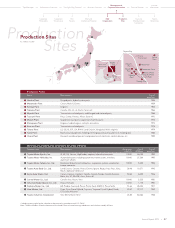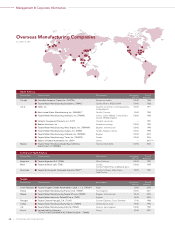Toyota 2009 Annual Report Download - page 30
Download and view the complete annual report
Please find page 30 of the 2009 Toyota annual report below. You can navigate through the pages in the report by either clicking on the pages listed below, or by using the keyword search tool below to find specific information within the annual report.
Toyota’s Basic Approach to Corporate Governance
Toyota’s top management priority is to steadily increase corporate value
over the long term. Further, our fundamental management philosophy is
to remain a trusted corporate citizen in international society through open
and fair business activities that honor the language and spirit of the law of
every nation. In order to put that philosophy into practice, Toyota builds
favorable relationships with all of its stakeholders, including shareholders,
customers, business partners, local communities, and employees. We are
convinced that providing products that fully cater to customer needs is
essential to achieve stable, long-term growth. That philosophy is outlined
in the “Guiding Principles at Toyota.” Further, to explain those principles
in more detailed terms, we prepared and issued the “Contribution
towards Sustainable Development” statement in January 2005. Through
such initiatives, Toyota is taking concrete measures to reinforce its
corporate governance functions and to become an even more competitive
global company.
Specifically, we have introduced a unique management system
focused on prompt decision making for developing our global strategy
and speeding up operations. Furthermore, we have a range of
long-standing in-house committees and councils responsible for
monitoring and discussing management and corporate activities from the
viewpoints of various stakeholders to ensure heightened transparency and
the fulfillment of social obligations.
Ultimately, however, a well-developed awareness of ethics among
individuals is the key to successful governance systems. Without such
awareness—regardless of the governance structure of a company—
corporate governance cannot function effectively. Toyota has a unique
corporate culture that places emphasis on problem solving and
preventative measures, such as problem solving based on the actual
situation on the site and highlighting problems by immediately flagging
and sharing them. In other words, because Toyota’s approach is to build in
quality through manufacturing processes, enhancing the quality of
everyday operations strengthens governance. Toyota’s management team
and employees conduct operations and make decisions founded on that
common system of checks and balances and on high ethical standards.
Toyota’s Management System
Toyota introduced its current management system in 2003. The main
differences between the current system and the former system are that the
current system set a new non-board position of Managing Officers and
reduced the number of directors. Under the current system, with respect
to various operational functions across the entire Company, in principle
the Chief Officers, who are Directors, serve as the highest authorities of
their specific operational functions while non-board Managing Officers
implement the actual operations. The distinctive feature of this system is
that, based on Toyota’s philosophy of emphasizing developments on the
site, the Chief Officers serve as the link between management and on-site
operations, instead of focusing exclusively on management. As a result,
this system enables the management to make decisions directly with
on-site operations by reflecting on-site personnel opinions on
management strategy and swiftly implementing management decisions
into actual operations. (As of June 23, 2009)
Systems for Ensuring Appropriate Management
As a system to ensure appropriate management, Toyota has convened
meetings of its International Advisory Board (IAB) annually since 1996. The
IAB consists of approximately 10 distinguished advisors from overseas with
backgrounds in a wide range of fields, including politics, economics, the
environment, and business. Through the IAB, we receive advice on a
diversity of business issues from a global perspective. In addition, Toyota
has a wide variety of conferences and committees for deliberations and
the monitoring of management and corporate activities that reflect the
views of a range of stakeholders, including the Labor-Management
Council, the Joint Labor-Management Round Table Conference, the
Toyota Environment Committee, and the Stock Option Committee.
Moreover, Toyota established the CSR Committee by integrating the
Corporate Ethics Committee and the Corporate Philanthropy Committee
in October 2007.
Accountability
Toyota has engaged in timely and fair disclosure of corporate and financial
information as stated in “CSR Policy: Contribution towards Sustainable
Development.” In order to ensure the accuracy, fairness, and timely
disclosure of information, Toyota has established the Disclosure
Committee chaired by an officer of the Accounting Division. The
Committee holds regular meetings for the purpose of preparation,
reporting and assessment of its annual securities report, quarterly report
under the Financial Instruments and Exchange Law of Japan and Form
Governance
Corporate
Corporate Governance
Management & Corporate Information
TOYOTA MOTOR CORPORATION
28


